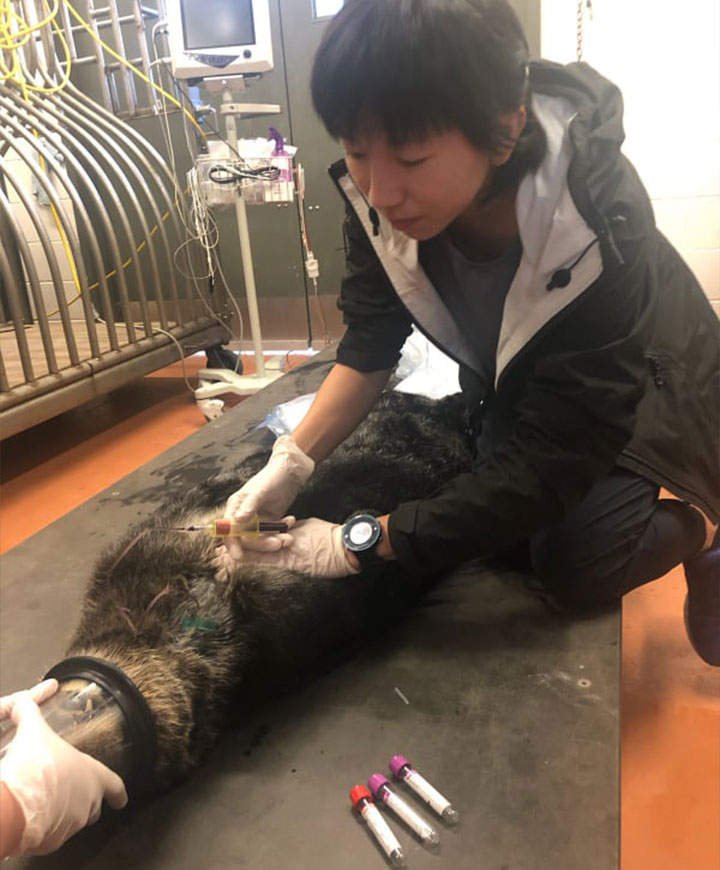Joie Lin - British Columbia
This past summer, I had the privilege of externing at the Vancouver Aquarium and Animal Health Centre (AHC), British Columbia’s state diagnostic laboratory, for four weeks. During this time, I also had the opportunity to work with the Marine Mammal Rescue Centre (MMR) and the British Columbia Marine Mammal Response Network (BCMMRN). Overall, the externship enabled me to gain valuable insight about aquarium medicine, marine mammal pathology, and fieldwork while also building my cultural awareness.
At the aquarium, I learned how to manage cases and develop diagnostic and treatment plans from Drs. Sarah Wright and Martin Haulena. The Vancouver Aquarium has a collection of 6,000+ species of animals, so this meant I had the privilege of caring for patients ranging from Northern Sea Otters to Scarlet Ibis. For example, I performed anesthetic monitoring for various fish and pinnipeds and learned how to approach species-specific anesthetic complications such as the dive response. In addition, I helped conduct diagnostics such as bloodwork and imaging, which allowed me to become familiar with the unique anatomy of marine mammals, birds, and fish. Through discussing diagnostic findings and differential diagnoses with my mentors, I solidified my understanding of the pathophysiology of different aquatic diseases, allowing me to work through cases effectively. Overall, externing at the aquarium expanded my comfort level for working with aquatic species, building upon my predominantly small animal veterinary education.
Since my externship happened to fall during the height of harbor seal pup season, I also had the opportunity to work with almost a hundred different seal pups at MMR, the Vancouver Aquarium’s wildlife rescue facility. Besides helping with animal husbandry, I helped conduct new admit physical exams, ophthalmic exams, and pre-release exams. Through this process, I learned about the nuances of marine mammal rehabilitation, such as management practices for poxvirus and phocid lungworms.
During the middle of my externship, I shadowed Dr. Stephen Raverty at the AHC and also helped the BCMMRN team with two field necropsies, assisting with disease investigation for several marine mammals. As someone passionate about wildlife pathology and ocean conservation, this was a dream come true, as the British Columbia waters are home to numerous endangered marine mammals, including orcas. For one of the field necropsies, we traveled by ferry, helicopter, and car to reach a young humpback whale that had died secondary to being entangled in black cod fishing gear. We collected morphometrics as well as tissues ranging from blubber to digesta. The various tissues were saved for diagnostics to assess parameters such as heavy metals levels, and the resulting data would later be evaluated and compiled to better inform practices promoting marine mammal conservation and One Health. By helping with different necropsies, I witnessed firsthand how marine mammals act as sentinels for ocean and human health.
All in all, my time in Vancouver was an invaluable learning experience that furthered my knowledge of different aspects of marine mammal medicine and also increased my cultural awareness. I had the opportunity to learn directly from world-renowned experts in the field, including Drs. Martin Haulena and Stephen Raverty, and collaborate with a diverse group of individuals such as marine mammal trainers and aquarists. Furthermore, at the various institutions where I externed, I saw how indigenous people were respectfully incorporated into their work, for instance by including them on whale necropsies for harvesting body parts for their community and culture. In the future, I hope to return to British Columbia and conduct research, contributing to marine mammal and ocean conservation efforts.



